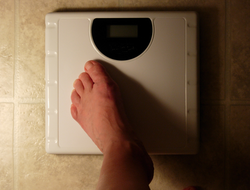Body Weight
Published: March 06, 2020
Numbers on the scale can be a guide to a healthy weight range, but focusing on a single number may not be helpful,
Body weight is dependent on several factors which influence the number you see when you weigh yourself.
The "ideal" body weight.
All too frequently weight loss programs imply that each person has an "ideal" body weight: a specific number that becomes your goal weight.
There are many internet sites which provide you with a calculator to help you determine your ideal body weight.
You typically enter your height, age, and gender and the calculator uses a mathematical formula to determine your ideal body weight either in pounds or kilograms.
For many years insurance companies used a simple height/weight formula as part of a health risk analysis to determine the potential risk of clients.
Consequently, body weight determined in this way has come to be thought of not only as an ideal body weight, but also as a healthy body weight.
However, a supposedly ideal body weight is not necessarily synonymous with a healthy body weight.
This iss because the number that appears when you stand on your scales, even if the scales are accurate, does not identify the body fat, lean tissue and water content of your body which contribute to your health.
Too much or too little body fat can be detrimental to your health and insufficient lean tissue such as muscle and bone can also lead to poor health outcomes.
Many people determine their ideal body weight by the way they look, and/or by their dress or pants size. Some people consider their teenage body weight as their ideal.
Frequently the body weight that is selected is unrealistic and may not support good health in the long term.
So what is a healthy body weight and what should you consider when your want to determine your healthy body weight?
A Healthy Body Weight
For many people a healthy body weight is associated with feeling good, physical appearance, clothes that fit, having energy, and healthy hair, skin and nails.
But what else should a healthy body weight provide you with?
Body weight is the numerical representation of the amount of lean tissue, fat tissue, and water in your body. In physiological terms a healthy body weight identifies a body composition that has enough fat and lean tissue to support good health and longevity.
A healthy body weight cannot be determined solely by a number on the scale, by the appearance of "slimness" or "fatness", or a dress size, and is unique to the individual.
Many people associate a heavier a body weight with being fatter and a lower body weight with being slimmer or having less body fat.
This is not necessarily the case as a person who is at their supposedly ideal body weight may have low bone density, and a high body fat to lean tissue ratio.
On the other hand a person who is seemingly overweight or has a body weight greater that the mythical ideal body weight, my have good bone density and a low body fat to lean tissue ratio.
If you exercise regularly you will likely have more muscle and denser bone than if you do not exercise. This will contribute to a heavier body weight, but does not mean that you are "fatter".
Increased lean tissue (muscle, including your heart muscle, and bone) increases your metabolism and your requirement for energy.
Fluid intake can dramatically change your body weight. One litre of water weighs one kilogram. If you drink 500 ml of water and then weigh yourself you will "gain" half a kilogram: slightly more than one pound.
If you are adequately hydrated you will be heavier than if you are dehydrated. Being heavier due to adequate hydration does not mean that you are "fatter".
Rather than focusing on a single number, a healthy weight range can be calculated using the Body Mass Index (BMI).
Aiming to maintain a body weight within that range may be healthier than attempting to adhere to one specific number.
However, BMI on its own does not provide you with a complete picture of your healthy body weight since, as with body weight, BMI does not identify your body fat to lean tissue composition or hydration level.
Body fat is essential, but some people carry too much body fat and others not enough.
Where your body fat is stored on your body can adversely affect your health.
Other body measurements such as Waist Circumference and Body Composition (lean/fat ratio) can provide you with a better understanding of where your body fat is stored and a more complete understanding of your "healthy body weight".
A healthy body weight can be your ideal body weight which can be achieved and maintained through eating well and being physical activity on a regular basis. Follow the links in this article and get healthy for life.
References
1.
Whitney, E. & Rady Rolfes, S. (2005). Understanding Nutrition (10th Ed.). Belmont, CA: Thomson Wadsworth

